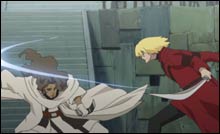Kurosawa’s classic becomes IFC’s Samurai 7, plus more, but not better, Henry Rollins
 “The Warring Age. On the battlefield, there were samurai. On the land, there were peasants. Following the war, the samurai became bandits who stole rice and trampled upon the villages. Resistance brought death. Their resounding mobility was the object of the peasant’s terror. And then . . . ”
“The Warring Age. On the battlefield, there were samurai. On the land, there were peasants. Following the war, the samurai became bandits who stole rice and trampled upon the villages. Resistance brought death. Their resounding mobility was the object of the peasant’s terror. And then . . . ”
And then, the bandits donned their robotic flying battle suits, with their massive butterfly-shaped transport ship — itself stretching hundreds of feet into the sky — following close behind, cutting a blazing swath through the sweeping rice fields.
Huh?
Fans of Akira Kurosawa’s 1954 epic The Seven Samurai, which spawned John Sturges’s 1960 The Magnificent Seven, are going to be surprised at what they find in Samurai 7, the Japanese animated series that debuts April 1 on the International Film Channel. (New episodes will air at 10:30 pm every Saturday through the fall.) The production notes promise “26 mind-blowing episodes.”
After viewing the first eight half-hour long episodes, do I consider my mind to have been blown? Well, not yet. But I can tell you that even the most critically praised anime programs have been slow burners, acquiring significance in retrospect only as the transparent (at first) plot threads begin to connect. Neon Genesis Evangelion and the Cartoon Network’s ongoing Ghost in the Shell: Stand Alone Complex are two of the best.
And what new ideas does Samurai 7 offer? Well, there’s the switch in medium from Kurosawa’s gloriously composed black-and-white photography (shot by long-time collaborator Asakazu Nakai) to high-definition color animation. And then there are those giant robots. But is it original? Art director Hiromasa Ogura imagines a colorful yet dirty future not of the cliché’d Blade Runner variety but of the post-apocalyptic, and equally cliché’d, Mad Max mold. Still, when the dust kicks up (as it does frequently when deadly katanas slice through robotic hides), you won’t likely complain. If there’s one thing that anime excels at, it’s kinetic action.
What’s more, the archetypically socialist story of a group united withstands the transition from the 16th century to an indeterminate future. Kurosawa’s film, after all, bore the influence of the American Western, and many Westerns borrowed from the Japanese chambara genre, so the dusty milieu feels appropriate. Sure, the junk-pile city of Kougakyo (where most of the first six episodes take place) may be a carbon copy of the Mos Eisley Spaceport from the Star Wars films, but wasn’t George Lucas’s space opera an elaborate reproduction of Kurosawa’s 1958 film The Hidden Fortress? And Kurosawa isn’t the only Japanese director whose influence is evident. His interest lay with the warrior; it was Kenji Mizoguchi who represented the lives of women and merchants, both of whom are defining additions here.
Samurai 7 does follow Kurosawa’s familiar set-up, right down to the lethargic pacing, which is sure to lose viewers in the early episodes. The hundred or so inhabitants of Kanna, a small farming village, live in fear of a band of 40 former samurai — the Nobuseri — who threaten to steal their rice crops during each year’s harvest. But the Nobuseri are no ordinary bandits; they’re humans who have “rebuilt their bodies into [mechanical] weapons so that they can fight,” and the ruling merchant-run government considers them to be “renowned patriots.”
Facing starvation, the villagers decide, “We’ve gotta kill the bandits!” The village Elder (Andrew Haskett) agrees. “We’ll hire samurai. We’ll let them eat their fill of rice — find us some hungry samurai.” So Kirara (Colleen Clinkenbeard), a beautiful and clairvoyant young “water priestess” (“through the water, I am able to sense different things”), sets out for Kougakyo with her pre-adolescent sister Komachi (Luci Christian) and fellow villager Rikichi (J. Michael Tatum) in tow.
Using her “Dowsing Crystal” — a divining pendulum that has been passed down through generations of her family — the trio navigate dangerous city streets filled with ronin (masterless samurai), gradually recruiting their band of seven samurai saviors. (Very gradually: by the end of the eighth episode, they’re still working on #7. That’s what happens when you have to expand 203 minutes of source material into 26 half-hour episodes.) Chief among them is Kambei (R. Bruce Elliott), “commander of a defeated army,” and the only one who didn’t take up a trade at war’s end, choosing instead to remain a meager samurai. Joining him is his “old wife,” Shichiroji (Duncan Brannan). Explains Kambei: “This is the man who I spent many years sharing joys and sorrows with during the war.” However, Shichiroji doesn’t appear until episode #7 (scheduled for May 13), whose rough animation contrasts with the other episodes’ merging of hand-drawn cell animation with computer-generated imagery and layered FX.